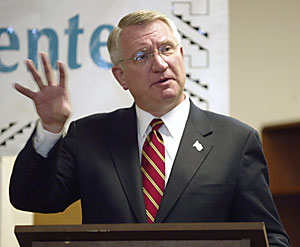 |
|
KEVIN B. KLAUS/Arizona Daily Wildcat
|
John P. Walters, Director of the White House Office of National Drug Control Policy (ONDCP), fields questions from the media yesterday afternoon at the Tucson Indian Center at 97 E. Congress St. Today Walters named three non-profit groups in Arizona that will be receiving federal funding for programs to fight drug usage.
|
|
|
By Jesse Lewis
Arizona Daily Wildcat
Tuesday, October 19, 2004
Print this
Three Arizona non-profit organizations received federal funding yesterday to institute programs to combat youth drug abuse, said U.S. Drug Czar John P. Walters in a press conference downtown at the Tucson Indian Center yesterday.
Walters, director of the White House Office of National Drug Control policy, said the grants will fund programs for junior high school and high school students, specifically American Indians and Latinos.
"Those who don't use when they are younger are less likely to use when they get to college and are much less likely to have a very abusive habit," said Rep. Jim Kolbe, R-Ariz., who also spoke at the press conference.
Pima Youth Partnership, Kino Weed and Seed and the El Centro Coalition were awarded the $100,000 in grant money.
The money from the grants will help establish the Drug Free Communities Program, which will work to keep youth away from drugs and alcohol by focusing curriculum around prevention, treatment and education.
"Talk to people about what is working. For those who think it's hopeless, it is working," Walters said.
The program will advocate prevention and how to keep youth from becoming addicted, he said.
 |
Those who don't use when they are younger are less likely to use when they get to college and are much less likely to have a very abusive habit.
– Rep. Jim Kolbe,
-Ariz.
|
 |
"The key is to prevent another generation from being lost to drugs," Kolbe said.
Kolbe said nationwide surveys have shown a significant decline in drug use among youth, thanks in part to the instillation of these types of prevention programs.
"If you keep teenagers from being exposed to drugs, alcohol, cigarettes, they will be very less likely to use in the future," said Tom Donovan, executive director of the El Centro Coalition, who also spoke at the press conference.
Robert Ybanez, chairman of the Pima Youth Partnership, said he has been working closely with members of the Pascua Yaqui tribe on the reservation to develop a program to battle alcohol and drug use and violence.
In 2003, 56 percent of youth on the reservation were drug abusers and 40 percent of adults were drug users, Ybanez said.
He said the percentage of American Indians who use drugs is higher than state and national percentages.
"Without prevention (the marijuana and alcohol) use will escalate to crystal meth, crack cocaine and heroin use," Ybanez said.
Kolbe said the grants do not directly affect UA students but will prevent youth from wanting to do drugs in the future.
"If you can prevent it from happening in the first place you can break the cycle," Kolbe said.
El Centro Coalition works with Hispanic youth in Tucson and sets up a forum for discussion on drug prevention strategies.
"(We will) eliminate or reduce alcohol use in west side youth and in time work with adults," Donovan said.
"We are building stronger families and community norms that say, no it's not OK to use drugs," Donovan said.
Donovan said the best people to advise users are former users.
"People who have suffered from drug abuse are the most generous," Donovan said.
Donovan said marijuana is being greatly abused by youth and is the biggest reason people enter treatment facilities.
"More young people are smoking marijuana than cigarettes and two-thirds of people [in treatment] in this country are in treatment for marijuana," Donovan said.
The El Centro Coalition is also working with Congress to allow random drug testing in schools.
"It is controversial, but it is used to get young people help," Donovan said.
He said instituting a random drug-testing program in schools is necessary to help students avoid using drugs.
"It changes the environment by bringing in truth. It creates a new environment where the community says we're not going to let this happen under our noses," Donovan said.
